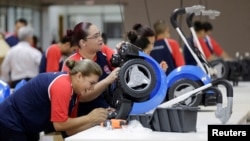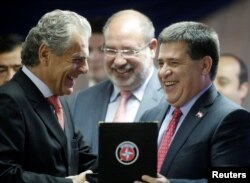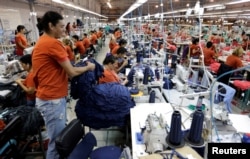When toymaker Estrela decided to move manufacturing capacity back to Latin America from China, it sank $2 million into a new factory not in its native Brazil - the region's largest economy - but in its tiny southern neighbor Paraguay.
The plant, which opened this month in the border town of Hernandarias, stands near a 4,500-hectare (11,000-acre) industrial park filled with Brazilian companies making everything from autoparts to clothing.
The dark-blue electric scooters assembled by 20 workers at the Estrela factory, known as a “maquila”, will be shipped across the border to Paraguay's giant northern neighbor under a Paraguayan system that allows hefty tax breaks for exporters.
An easy decision
For Carlos Tilkian, chief executive of Manufatura de Brinquedos Estrela SA, it was an easy decision to open the assembly plant in the landlocked nation of just 6.8 million people sandwiched between Brazil and Argentina.
Paraguay has important competitive advantages: cheap energy, labor flexibility and low social charges on wages, he said in an interview before the factory's inauguration. “In Brazil, this would be much more expensive.”
Brazilian companies increasingly have been flocking to Paraguay since the election of former-businessman turned President Horacio Cartes in 2013, when he steered his nation to the right after the impeachment of leftist Fernando Lugo.
In a bid to create jobs, Cartes built on a 1997 reform that allowed foreign exporters to pay taxes in the low single figures and excluded them from customs tariffs with additional pro-business measures. Though more than 90 percent of its manufactured goods go to Brazil, Paraguay's Mercosur trade bloc membership also gives exporters easy access to Argentina and Uruguay.
Since Cartes's election, the number of foreign manufacturers in Paraguay has nearly tripled, according to government figures, also spurred by Brazil's worst recession on record. The economic downturn has forced manufacturers to cut costs to remain afloat amid onerous taxes and bureaucracy.
Of the 126 foreign manufacturers now in Paraguay, four-fifths are Brazilian.
The move by Brazilian companies southward is sparking outrage among Brazilian unions.
Anthony Lisboa, secretary for international relations at Brazil's umbrella union federation, denounced the “maquila” system, saying it relied on “slave labor.” He said he was trying to galvanize opposition in Paraguay — which lacks Brazil's tradition of organized labor.
“The U.S. auto industry has the same issue with Mexico: they are simply moving production to a country where laws permit worse working conditions,” Lisboa said.
Brazilian businesses and economists say jobs created in Paraguay are replacing jobs in China, not Brazil, and that Brazil benefits from a more prosperous neighbor.
“As China gets more expensive, it becomes viable for some industries to produce closer to home and Paraguay is close to home,” said Thomaz Zanotto, foreign trade director for Sao Paulo's powerful business chamber FIESP. “This is not going to rob Brazilian industry — Paraguay is not big enough for that — but ... it shows we could be more cost competitive in Brazil if we had better economic policies.”
'Better quality of line'
Hernandarias' residents are overwhelmingly in favor of the Brazilian factories. The town of 80,000 has long been overshadowed by its neighbor Ciudad del Este, the second-largest city in Paraguay and home to a giant street market hawking everything from contraband perfume to televisions and assault weapons.
Convenience store worker Fabiola Vargas, 22, said the factories offer an option to residents who relied on part-time or informal jobs in Ciudad del Este as Paraguay tries to shed its reputation as a hub for illicit trade and finance.
“We won't have to travel so much and will have a better quality of life,” she said.
Brazilians invested $101 million in Paraguay in 2015, according to the most recent Paraguayan central bank data, more than one-third of the total foreign investment of $260 million.
After posting China-paced growth as recently as 2010 amid a commodities boom, Brazil now has the highest unemployment ever among its 207 million inhabitants. By contrast, Paraguay saw GDP growth of at least 4 percent last year, helped by the manufacturing boom.
Eduardo Almeida, the Inter-American Development Bank representative in Paraguay, said a 2015 law guaranteeing foreign companies investing more than $100 million a stable tax rate for 20 years had provided vital stability.
Brazilian meat packer JBS SA, the world's largest, said Paraguay's stability was important to its decision to double output there this year and lift national revenues to $550 million.
“Paraguay is an economy that grows, has clear policies, and stable monetary policy,” its local director Felipe Azarias told Reuters.
In Brazil, ranked among the world's most expensive nations to do business, benefits and taxes inflate workers' salaries by 40 to 60 percent, according to Rio de Janeiro-based think tank FGV.
Labor costs are on average 45 percent less in Paraguay than in Brazil, while companies pay average taxes of around 3.5 percent in Paraguay, compared to 36 percent in Brazil, Almeida said.
Cartes' government says it created 21,333 manufacturing jobs between August of 2013 and December of 2016, generating $900 million in exports.
Discontent
In Paraguay, some academics say Cartes' policies are depriving the government of revenue for long-term development, particularly in infrastructure.
“The more exceptions and exemptions we have on manufacturing, the more we deprive the treasury of something foreign investors themselves need — financing for infrastructure,” said Fernando Masi, director of the Asuncion-based Center of Analysis of the Paraguayan Economy.
A source at a large Brazilian infrastructure company said Brazilian builders had mostly left Paraguay due to concerns the government did not have the money to provide support for private investment in bridges, dams, airports and other projects.
Paraguay's Commerce and Trade Minister Gustavo Leite told Reuters that Cartes is committed to the low-tax policy and has no plans to seek more revenue from Brazilian companies.
“If jobs are so important, why wouldn't we take care of employers,” Cartes said at the Estrela factory opening. “This is the Paraguay I believe in: we take care of those who provide jobs.”







